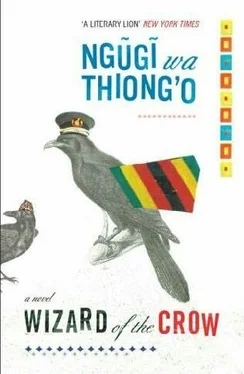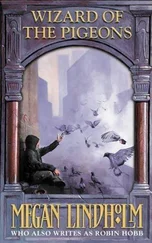Happy were they
That gave up fishing in the lakes
And they became fishers of men
The tune was not happy-it was actually sad, at least in the singing of it. Even when it was over the tone remained in the air, and it made Kamltl feel tears at the edges. He raised his head to tell her that he loved her and that he would not bear any ill will toward her or presume to judge her choice of what she would do, but Wariara was no longer there. He wanted to say, Please don’t go, but he had nothing to call her back to, not even a sense of hope that things would be better tomorrow. So he sat there under the tree, the shade and morning dew of which they had shared, watching her go down the hill until he could no longer make out her form against the distant landscape. She never once looked back, and now Kamltl let his tears flow down his cheeks and did not make any effort to wipe them away.
He decided not to go to the city. But what was he to do with his time? Kamltl never took alcohol. Now he turned his pockets inside out and found enough to take to the nearest bar. Instead of walking about the streets of the city, he would stay indoors, a lone fixture at the counter. Maybe if he tossed down two or three beers he would feel good, and even if he failed to feel good, he would at least forget the turn his life had taken. He closed his eyes and gulped down the first bottle. He did the same with the second and the third. He stopped counting and he did not know how many he tossed down. He continued drinking thus for a week or so, as if he did not really want to wake up to reality, and as he did not have much money, he resorted to cheaper brews. There was a night when he drank so much of the brew that he could not tell how and when he eventually staggered out of the bar to the backyard and fell asleep, seduced by the warmth of his own vomit. When in the morning he woke up and found himself covered with his own spew, he decided that alcohol was not the cure for his problems, be they of the body or the spirit. But how could he have succumbed to the seduction, he often wondered, afraid of his weakness, and he thereafter avoided bars like the plague.
Kamltl never saw Wariara in Klambugi again. He continued staying in the village, but without Wariara life was no longer the same. Although in the last days of their friendship their review of their encounters in the city had become rarer and rarer, he still missed their occasional review of the day’s hunt for jobs. It was increasingly difficult and hollow to live in the village where everything, even matatu rides in the morning, reminded him of her. Besides, he feared that everybody was aware of his alcoholic spell. He too decided to leave Klambugi for Eldares for, as he reasoned to himself, a fisherper-son does not cast the net in the same spot or a farmer continue planting seeds in the same hole.
He continued looking for a lucky break in Eldares but without ever getting it and without even seeing any glimpses of light at the end of the tunnel of his life up to that point. In the first few months Kamltl thought about Wariara, often wondering where she was, what she was doing, how she was surviving, or even whether she was alive. But months and months of daily problems eventually removed any lingering images of Wariara from his mind. He had enough problems of his own without having to add to them by worrying about another free agent.
Yes, there were countless disappointments in his three-year search for a job, some heart-wrenching, but none had plunged him into such depths of humiliation as the fake job interview. Was it because it was the culmination of what had happened to him the entire day since morning? Indeed, were he a believer in witchcraft, curses, and evil spells, Kamltl would have taken what had happened to him in the morning as a sure sign that, right at the break of day, somebody had cast evil his way.
On waking up to start what he now called his day of humiliation, Kamrö had made an important decision about the way he would support himself in this cruel city. He would follow what he called Buddha’s footsteps, or at least those of his followers. The best hours for this would be in the evening when it was a little dark: he did not want any of his friends or former classmates to meet him in his new occupation, however holy. He therefore set himself two tasks for daytime: continue knocking at offices for a job and also look around for the most promising premises of his new occupation of begging. Market survey, he called it.
He started his scouting mission at the Buler’s Plaza, situated in the city center. Around the plaza were some of the leading hotels, the haunts of foreign clients, particularly tourists from Europe, America, and Japan. He passed by Angel’s Hotel and when he saw how crowded it was with tourists, even at that hour of the morning, he stopped, and the thought crossed his mind, Why don’t I take the first step in the imitation of Buddha here and now instead of waiting for the evening hour? His eyes moved along the crowded veranda all the way to Angel’s Corner, famous for its acacia bush around which were chairs and tables graced by waiters in white flowing dresses, red bandanas, and of course marching red fezzes.
It was then that his eyes fell on… who? Margaret Wariara? He had not seen her for more than two years, and now this! She was dressed in a miniskirt, high heels, and a brown wig. She stood holding hands with a white tourist whose hanging belly was held in place by two suspenders, waiting for the waiter to finish clearing and tidying up their table. And then Wariara turned her head and for a split second hers and Kamltl’s eyes met before she resumed her previous posture by her man. Both Wariara and Kamltl knew that they had seen and recognized each other, but they acted as if their eyes had not actually met. They never exchanged a word, a look, not even an embarrassed gesture of recognition. Kamltl moved away quickly as if safari ants had suddenly bitten his legs.
He tried to make himself feel angry with her, but no matter how he tried he did not feel anger, for he could not see the difference between what he had decided to do, the Buddha way as he called it, and what she was doing at Angel’s Corner-the way of the fishers of men, as she had called it in the song of farewell. But the encounter with Wariara at Angel’s Corner did temper his earlier embrace of the Buddha’s way, and he decided to knock at more office doors and see if one of them would open for him to enter. One lucky break after more than three years of searching was all he needed.
And indeed, moving from office to office asking the same question, is there any vacancy, was what he did the rest of the morning, until the middle of the day when hunger drove him to the foot of the garbage mountain to see if he could find some cast-off tomatoes or the remains of any other edibles. What he liked about tomatoes, pineapples, and bananas was that no matter the dirt on them he could always peel off the skin and reach the clean content. As it turned out, he did not pick up anything because that was the time he collapsed and felt himself, or rather his soul-self, disconnect from the hungry body.
The two incidents, the encounters with Wariara and then with death, were what made him desperate to get a job before he had taken a step in Buddha’s way. He did not want his and Wariara’s paths to ever cross again in any angel’s corners in Aburlria or anywhere else. And it was this desperation that had made him ingratiate himself with Tajirika, ending up with his drinking dregs from the cup of humiliation.
Standing by the side of the road, pressing hard against the wall, he felt all his afflictions coalesce into one, and an intense pain suddenly jolted him away from the wall and onto the road again to beg. The first step in any enterprise is the most difficult, but procrastination was not an option. The only place he had to skirt was the Ruler’s Plaza, where he had seen Wariara and her new lover; otherwise it did not matter to him where to begin.
Читать дальше












